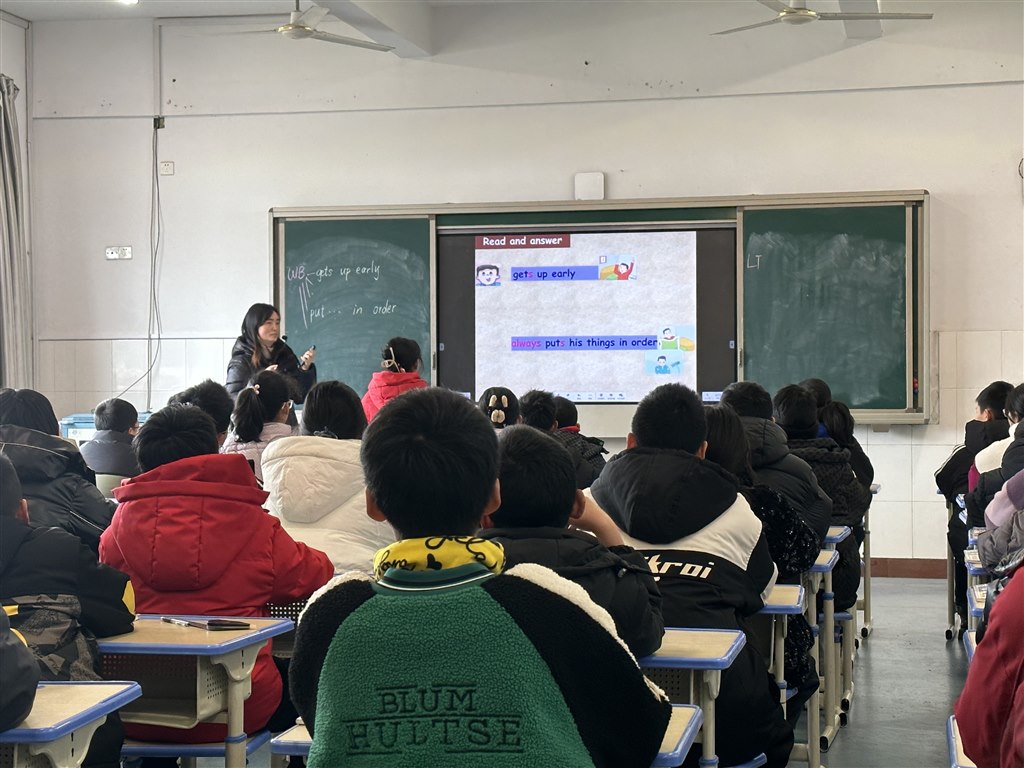Unit 2 Good habits
一、教学内容:
Story time
二、教学目标:
1、能听、说、读单词:habit, never, finish, tidy, fast, in order, sleepy, bad。
2、能尝试根据所学短语和句型来描述自己的习惯。He also does well at home.
3、能初步根据提示写出好的习惯。
4、能正确理解、朗读课文并可以根据提示复述课文内容。
5、能分清好坏习惯,并知道以好的习惯来要求自己,让自己拥有更多好的习惯。
三、教学重难点:
1、学习并使用新的词汇与词组:habit、never、finish、tidy、fast、at night、bad, He gets up early in the morning. He never goes to bed late.He also does well at home.
2、让学生懂得好习惯的重要性
3、让学生学会表达自己的习惯 。
4、提高学生的语用能力和思维能力。
四、教具、学具准备:
板书、课件
五、教学过程:
Step 1 Warming up
1. Greetings
2. T:Do you want to know more about me?
T:My day.Hello,I’m ….I get up early in the morning.I have breakfast at….I go to school at….I come to school at….I go to bed at….I have a …day.What about you?
3.T:I get up early and go to bed early too.They’re my habits.Today we will learn Unit2 Good habits.
Step 2 Presentation
1. Watch and match
T: You have some good habits. Wang Bing and Liu Tao have some habits too. What habits do they have? We should watch the cartoon and match. Here are some choices. Let’s read first.
Teach: finish(finishes), put … in order
T: Let’s watch the cartoon carefully. Watching carefully is a good habit.
Match (on P18)
Check: What habits does Wang Bing/ Liu Tao have?
Wang Bing chooses bef. Liu Tao chooses acf.
2.Wang Bing’s good habits
(1) 根据反馈呈现板书:gets up early, puts his things in order, finishes his homework early
(2) Read and think.
Wang Bing has many habits. What other habits does he have? Let’s read and think. Reading carefully is a good habit.
Check.
Teach: never
He never goes to bed late. Tell me the meaning in English.
(3) Retell: What are Wang Bing’s habits?
(4) T:How many habits does wang bing have?
(5) Are these habits good or bad?
板书 good habits
3. Liu Tao’s habits
(1) Wang Bing has so many good habits. So he’s a good boy. What habits does Liu Tao have?
Read and find.Underline the key words,then say it to your classmates.
(2)一组学生上台划,一组学生上台写思维导图
(3)check,教sleepy
(4)T:What good habits does Liu Tao have?
T:What bad habits does Liu Tao have?
T:Can you help him? I think Wang Bing wants to give him some advice. What’s his advice?
Ss: You should/shouldn’t…
(5) Compare and say
Wang Bing has good habits, he….But Liu Tao …
(6) Imagine: Liu Tao feels sleepy, what will happen?
Ss: Maybe he will/ can’t…
6. Read the story
7. Retell
Step 3 Consolidation
Think and write
1.T: Good habits are important for us. Look, there are some good habits, please complete them.
2.T: Do you know other good habits? Please write down.
Step 4 Homework
1. Read the story.
2. Find your bad habits and try to change.
3. Learn others’ good habits.
七、教学板书:
Unit 2 Good habits
What habits do they have?
Wang Bing Liu Tao
gets up early listens to his teachers
brushes his teeth in the morning
and before bedbime good habits keeps his room clean and tidy
puts his things in order
never goes to bed late helps his parents
finishes his homework early
bad habits does not go to bed early
does his homework late
反思:
一、背景
Unit 2 Good Habits是关于生活习惯的教育主题,对于学生养成良好的生活习惯、培养健
康的生活方式具有重要意义。在教学过程中,我力求通过多种教学活动和手段,使学生充分
理解并认识到良好生活习惯的重要性,同时激发他们的学习兴趣和积极性。
二、教学目标
本单元的教学目标是让学生了解良好的生活习惯对于个人成长和健康的重要性,培养他们养
成规律作息、健康饮食、适量运动等良好习惯。同时,通过学习课文和词汇,提高学生的阅读
和词汇运用能力。
三、教学内容与活动
在教学过程中,我组织了多种教学活动,如小组讨论、角色扮演、课堂游戏等,以激发学生的学
习兴趣。同时,我注重引导学生自主探究,让他们通过观察、思考和实践,自主发现良好生活习
惯的意义和方法。此外,我还利用多媒体资源,展示相关图片和视频,帮助学生更好地理解课文
内容。
四、学生反馈与评价
在完成教学后,我对学生进行了问卷调查,了解他们对本单元的学习感受和反馈。大部分学
生表示,通过学习本单元,他们对于良好生活习惯有了更深刻的认识,并且在学习过程中
感受到了乐趣。同时,也有部分学生提出了一些建议,如增加更多与生活实际相关的例子、
加强词汇练习等。
五、教学不足与改进措施
根据学生的反馈和自己的反思,我认为在本单元的教学中存在以下不足:
1.部分活动设计不够贴近学生的实际生活,导致学生在活动中缺乏共鸣和体验感;
2.部分词汇和语法点的讲解不够深入,需要进一步加强练习和巩固;
3.在评价方面,需要进一步完善评价标准和方式,以更好地激发学生的学习兴趣和动力。
针对以上不足,我计划采取以下改进措施:
1.在活动设计上更加注重贴近学生的实际生活,增加更多与学生生活相关的例子和情境;
2.加强词汇和语法点的讲解和练习,采用多样化的教学方式和方法,帮助学生更好地掌握和应用;
3.进-步完善评价标准和方式,注重过程评价和学生自评的结合,激发学生的学习动力和自信心。
六、结语
总的来说, Unit 2 Good Habits的教学取得了一定的成果,但也有一些需要改进的地方。
在未来的教学中,我将继续努力探索更加有效的教学方法,注重学生的实际需求和体验,
帮助他们更好地掌握知识和技能。同时,我也希望通过不断反思和改进自己的教学,提高
自己的教学水平和专业素养。


 苏公网安备 32041202001123号
苏公网安备 32041202001123号 